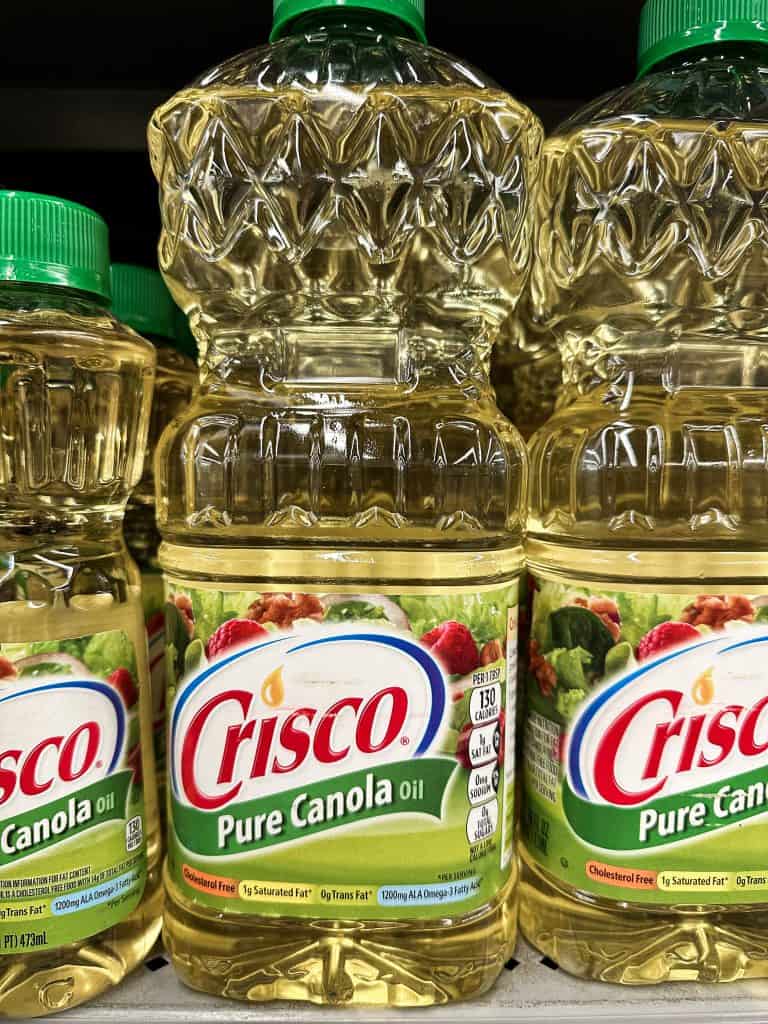Best Oil for Seasoning Cast Iron
When it comes to the best oil for seasoning cast iron, choosing the right oil can make all the difference. Seasoning your cast iron cookware is one of the most important aspects of maintaining it properly.

Cast iron cookware has been a favorite among home cooks for generations. It is durable, versatile, and provides even heat distribution.
Unlike non-stick cookware, cast iron can handle high heat. This makes it perfect for searing meats and creating a crispy crust on foods like cornbread and pizza.
Cast iron has non-stick properties. These properties improve with use, allowing you to cook with less oil. Cleanup is then much easier.
What is Seasoning Cast Iron?
Seasoning cast iron creates a non-stick surface on the cookware by applying a layer of oil or fat and heating it to a high temperature.
This process polymerizes the oil, creating a hard, smooth coating that protects the cast iron from rust and helps prevent food from sticking to the surface.
Over time and with repeated use, the seasoning on cast iron cookware becomes more durable and effective. Seasoning cast iron is essential for maintaining and prolonging the cookwares life.
Without proper seasoning, cast iron can become rusted and difficult to clean, and food may stick to the surface, making cooking less enjoyable.
The best way to season cast iron skillets is simple. Read How to Season Cast Iron Pans for a more in-depth tutorial.

Polymerization of Cast Iron Seasoning
In cast iron cookware, polymerization creates a hard, non-stick surface. This is done to the cookware by heating a layer of oil to a high temperature.
During the seasoning process, the oil undergoes polymerization. This forms a layer of seasoning bonded to the cast iron forming the hard black surface. This layer provides non-stick properties and helps protect the cast iron.
Therefore, choosing the best oil is essential when seasoning cast iron cookware. This process helps to create a pan with a long-lasting smooth surface. It can become an heirloom for future generations.
Why Does Cast Iron Need to be Seasoned?’
Cast iron must be seasoned to protect it from rust and other forms of corrosion. It also creates a non-stick surface that prevents food from sticking to the cookware and makes cleaning easier.
Seasoning a pan is an important part of any cooking process. When a pan is properly seasoned, it can become a reliable kitchen essential.
The seasoning helps form a protective layer on the pan’s surface, preventing food from sticking. A well-seasoned pan can cook dishes like blueberry crisp, skillet fajitas, and pan fried potatoes.
Therefore, seasoning is essential to preserving and lengthening the life of cast iron cookware.
Here is a look at several factors when choosing the best oil for cast iron skillet seasoning.


Best Oil Qualities for Seasoning Cast Iron
Cast iron seasoning oil should have certain qualities to make it great:
- High Smoke Point – the smoke point is the temperature when an oil begins to break down and create smoke. It is best to opt for an oil with a high smoke point between 400-500 degrees.
- Neutral Flavor – the seasoning oil should have a neutral flavor that does not overpower the natural flavors of the food.
- Polyunsaturated Fats – when choosing a seasoning oil, it is recommended to opt for one with a high proportion of polyunsaturated fats in relation to monounsaturated fat.
Best oil for Seasoning Cast Iron
The best oil for seasoning cast iron has a high smoke point and is stable at high temperatures. This allows it to polymerize and create a hard, non-stick surface on the cast iron.
Here is a look at some of the best cast iron seasoning oils for the best results.
Grapeseed Oil
Grapeseed oil is popular for seasoning cast iron because of its high smoke point and high polyunsaturated fat content. The high smoke point of grapeseed oil makes it the best oil to use on cast iron. This means it can be heated to high temperatures making it ideal for seasoning cast iron.
Furthermore, grapeseed oil has a neutral flavor, which makes it a good choice for seasoning cast iron without imparting any unwanted taste or odor to the food cooked in the cast iron.

Sunflower Oil
Sunflower oil is a great option for seasoning cast iron cookware because it has a high content of polyunsaturated fats. This is important for polymerization – the chemical reaction that creates the seasoning on cast iron.
Using sunflower can create a durable and non-stick seasoning on cast iron that can withstand repeated use and cleaning.
Avocado Oil
If you want a tough and effective seasoning for your cast iron pan with the best non-stick qualities, avocado oil is also a popular choice.
A thin layer of this oil will leave your skillet cooking like a dream, plus its high unsaturated fats make it ideal for polymerizing and oxidizing. However, it is more costly than other options.

Seasoning Cast Iron with Olive Oil
While extra virgin olive oil can be a great ingredient for cooking, it is not recommended for seasoning cast iron. Olive oil has a lower smoke point than other oils.
This can lead to a sticky residue that is difficult to remove and can negatively affect the flavor of your food.
Coconut Oil
Regarding seasoning cast iron cookware, coconut oil is not the ideal choice due to its high saturated fat content. This can inhibit the polymerization process for creating a durable seasoning layer on the cast iron.
However, coconut oil is a great oil for cooking foods in a cast iron skillet and using for oiling the skillet after each use.

Seasoning Cast Iron with Flaxseed Oil
Flax seed oil is unsuitable for seasoning due to its low smoke point. Unrefined flaxseed oil has a smoking of only 225F. When heated, flaxseed oil produces a dark patina due to its low smoke point.
Even though a skillet seasoned with flaxseed oil may look perfect, its seasoning is usually brittle and prone to flaking, making it unsuitable for regular cooking.

Animal Fats
While animal-derived fats, such as lard, bacon grease, and beef tallow, are useful for protecting a cast-iron pan after cleaning, they are not the best option for creating a new layer of seasoning.
Instead, using animal fats serves to preserve and enhance the existing seasoning. Animal fats are also the best oil for cast iron cooking.
Our grandmothers had well-seasoned cast iron cookware, not necessarily due to animal fats but because the pans were regularly used.
Other Oil Options
The other most popular oils include canola oil, peanut oil, animal fats, and soybean oil. Ultimately, finding the type of oil that works best for your needs is crucial.
Consider factors such as the oils smoke point, flavor, and health benefits. Researching the different oils and their properties can help you determine the best choice for your cast iron seasoning needs.

Worst Oil for Seasoning Cast Iron
The worst oil for seasoning cast iron would be any oil with a low smoke point, such as butter, extra virgin olive oil, and coconut oil.
These oils are prone to burning and breaking down at high temperatures, leaving a sticky or gummy residue on the cast iron.
How Often to Season Cast Iron
How often to season a cast iron skillet depends on how frequently it is used and how well it is maintained. Generally, it is recommended to season the skillet once the non-stick surface has begun to wear off or it is starting to rust.
Proper care, such as oiling the skillet after each use, can maintain its seasoning for a long time. Ultimately, the frequency of seasoning depends on the individual’s use and upkeep of the cast iron skillet.

Best Way to Season a Cast Iron Skillet
The best way to season a cast iron skillet is to use it as much as possible. Each time you cook with the skillet and heat the oil, you create a new protective layer of seasoning that helps build up a non-stick surface over time.
This process strengthens the existing coating and ensures the skillet becomes more effective at cooking food with every use.
Therefore, the more you use your cast-iron cookware, the better it becomes. Additionally, using the skillet often helps to prevent rust and maintain its overall quality.
How Do You Treat Cast Iron After Each Use?
It is important to differentiate between seasoning and oiling your cast iron skillet after each use. For treating cast iron after each use, I recommend applying a thin layer of oil to the skillet after cleaning and drying it thoroughly.
How to Oil a Cast Iron Skillet
To oil a cast-iron skillet, use a paper towel to apply a thin layer of oil all over the surface and wipe any excess oil, as too much oil can create a sticky surface.
By consistently practicing good maintenance techniques, such as oiling your skillet, you will find that you rarely need to season your cast iron in the oven.

If you want to learn more about cooking with cast iron and how to take care of your cookware, check out the blog posts below. They provide helpful tips on maintaining and caring for cast iron properly.
In conclusion, when it comes to the best oil for seasoning cast iron, the most important thing to consider is the oil’s smoke point to create a non-stick layer.
Oils with a higher smoke point, such as grapeseed or sunflower, are ideal for seasoning as they can withstand the high temperatures needed to create a durable and long-lasting seasoning on the pan.
However, in addition to proper oil selection, the best seasoning for cast iron is regular use. This is key in building up and maintaining a seasoned surface.
With everyday use, cast iron cooking can be a durable addition to any kitchen.





